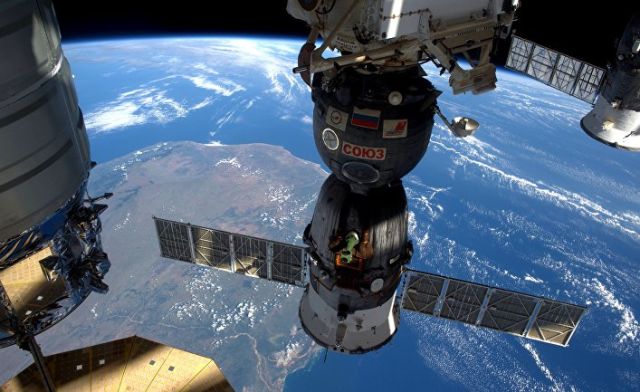The station's location in orbit from 60 to 80 degrees north latitude will provide increased opportunities for viewing the entire territory of Russia
MOSCOW, July 1. /TASS/. The Rocket and Space Corporation (RSC) Energia has considered four different options for creating a Russian orbital service station (ROSS). This is stated in the company's annual report for 2020.
"As part of the work carried out, four options for creating a Russian orbital service station (ROSS)were considered both on the basis of the ISS modules, and on the basis of newly developed modules in orbits with different inclinations, " the document says.
It is also noted that the station's location in orbit from 60 to 80 degrees (or more) north latitude will provide increased opportunities for viewing the entire territory of Russia. This will allow monitoring the situation on the oil and gas transport infrastructure of the Russian Federation. From the board of the station, it is possible to quickly identify natural and man-made disasters in remote and hard-to-reach areas of the country. To monitor the ice of the Arctic seas, to conduct technical experiments to develop technologies for lighting the polar regions of the Russian Federation in winter. And also to conduct studies of the Earth's magnetic field, atmospheric effects, limbo observations near the poles of the Earth.
"These opportunities make the project attractive for investment from the oil and gas industry and other customers. The construction and targeted use of near-Earth manned infrastructure can be carried out using Russian cosmodromes," the report notes.
In April, Deputy Prime Minister Yuri Borisov said that the state of the ISS leaves much to be desired, so Russia is considering the option of creating its own orbital station.
Testing of models of the Scientific and Energy Module
RSC Energia has also conducted tests of models of the Scientific and Energy Module, work on the software continues. "In 2020, the following works were carried out: separate tests of models were carried out, work continues with the software (software) of the onboard equipment of the NEM-1 product," the document says.
Earlier, the head of Roscosmos, Dmitry Rogozin, said that the Rocket and Space Corporation Energia was tasked with ensuring the readiness of the first module for the new Russian orbital station in 2025. According to him, he is already in the work. The head of the state corporation also published a video of the first module being created - it will be a scientific and energy module, which was previously supposed to be launched to the ISS in 2024.




